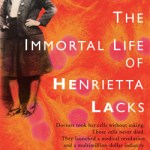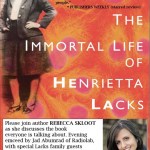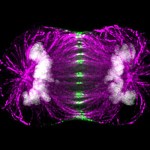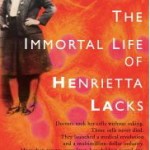HeLa
When I first started my independent academic laboratory in 1992, it was in a brand new facility across the parking lot from a then 40-year-old building named in honor of the woman to the right. I took on a big teaching load from day one and while I had some cash left from the $50,000 start-up package, I didn't hire a technician immediately. So it fell upon me to do all the ordering of the basic supplies to get the operation rolling. No problem, right? I ordered much of my own stuff as a postdoc so it should be no problem to get everything I need to start the lab from scratch.
One of the…
Today's Baltimore Sun features a great OpEd by Ruth Faden, director of the bioethics institute at Johns Hopkins, exploring the ethical and moral issues raised by The Immortal Life of Henrietta Lacks, and its relevance to the current debate over health care reform. In it she says, among other things:
... Henrietta Lacks story touches the very heart of the
current debate over health care reform, and the need for universal
coverage and access to care. Her tale, like health care reform and the
ethics of biomedical science, is tied up in how the least of us live.
We need a national…
Just finished listening to Rebecca Skloot talking about her book, The Immortal Life of Henrietta Lacks, on Fresh Air this afternoon. You can now listen on the web (transcript not yet available).
Around 25:10, Skloot tells Terry Gross about an experience she had with a faith-healing ceremony with members of Henrietta Lacks's family. Among other things, that was the point when Skloot realized that she had to write herself into her own book. It was also the turning point when Lacks's daughter became more trusting of Skloot the journalist. I recommend that you listen to the whole interview…
A quick post as I run out the door for the teeveey studio: Set your TiVos and your DVRs, mark your calendars: Tonight I'll be on ABC World News talking about my new book, The Immortal Life of Henrietta Lacks. The segment will also feature members of Henrietta's family, and Vincent Racaniello with lots, and lots of HeLa cells.
ALSO: The first reviews of The Immortal Life are starting to hit newspapers. There's a terrific review on the front page of the Washington Post Outlook section today, and another great one in the St. Petersburg Times. Update: This great…
Hits of the week:
Savage Minds (with a spiffy website redesign) asks Why is there no Anthropology Journalism?
Jerry Coyne takes sharp exception to both a paper and a SciAm Mind Matters article by Paul Andrews and Andy Thomson arguing that depression might be an evolutionary adaptation. Dr. Pangloss punches back. (NB: 1. I was founding editor of Mind Matters, but no longer edit it, did not edit the Andrews/Thomson piece, and don't know any of these people. 2. While my recent Atlantic article presented an argument for how a gene associated with depression (the so-called SERT gene) might be…
After ten long years, the serious countdown has begun for the publication of my book, The Immortal Life of Henrietta Lacks, which will be on sale nationwide exactly SEVEN DAYS from today. I've been posting about my impending book tour, and all the great coverage the book has been getting, on Twitter and Facebook, but thought I'd also post a bit of a press round up here, and an update, for those who (gasp) don't spend all of their time in those places.
If you don't know what my book is about: it tells the story of a poor black tobacco farmer whose cancer cells -- taken without her…
Look in any biomedical laboratory, and you will find HeLa cells. Over 50 million tonnes of these cells have been grown in churning vats of liquid all over the world. They have been one of the most important tools in modern medicine, pushing forward our understanding of cancer and other diseases, and underpinning the polio vaccine, IVF, cloning, and more. None of these advanced would have been feasible without HeLa. Most scientists have used or seen them but most have no idea about their origin. It's time to find out.
In early 1951, there was only one place in the world where HeLa cells could…
I've been meaning to post about this for several weeks, but as we all know, things have been a weee bit hectic. But now, finally: News on the informed consent for using tissues in research front.
Since the 1960s, US law has mandated that all newborns be screened for
genetic diseases. What most people don't know is that those samples
are often stored and used in future research without the knowledge of
the parents (or, obviously, the children). I write about this in the afterward of my book, which is of course directly related to this issue.
For decades ethicists, scientists…
Are you in New York? Anywhere near New York? If so ... mark your calendars and come join us for the PUBLIC BOOK LAUNCH EVENT we've all been waiting for (well, at least we here at Culture Dish have been waiting for it ... plus a few other folks): In an evening emceed by Jad Abumrad of RADIOLAB, I'll be talking about my new book, The Immortal Life of Henrietta Lacks ... and rumor has it, some of Henrietta's family members will be there with me to answer your questions and SIGN YOUR BOOKS! Also, we will have live HeLa cells for people to see. So much excitement, we can…
This past weekend's international science communication conference, ScienceOnline2010, also saw the first, final hardback copies of Rebecca Skloot's long-awaited book make it into the hands of the science and journalism consuming public. Moreover, an excerpt of The Immortal Life of Henrietta Lacks has just appeared in the new issue of Oprah Winfrey's O Magazine. And already, those online science communicators who left the conference with Skloot's book are registering their praise via this Twitter feed that was so active it was a trending topic at the science aggregator, SciencePond.
The story…
On Friday, I wrote a post about the 20th anniversary of my PhD dissertation defense and my reverence for Henrietta Lacks, the woman whose cervical cancer gave rise to the first immortalized human cell line and the primary system for my work. I also alluded to The Immortal Life of Henrietta Lacks, the upcoming book by Rebecca Skloot that is already garnering extensive pre-release praise.
I was, as readers have come to expect, quite a bit sentimental and reflective, with a call that we all do our part to somehow acknowledge those patients whose tissues make it possible for us scientists to do…
Big week here at Culture Dish! The Immortal Life of Henrietta Lacks and its author (yours truly) were on the cover of Publishers Weekly (please note: THRILLED!). Inside that issue was a profile of me with some of book's backstory, a short excerpt from the book (longer excerpt coming soon in O, the Oprah Magazine), also a story I wrote about the crazy book tour I'm organizing (posted about previously here). But that was just the beginning of this week's HeLa developments. More about that after the jump, but first, a warning: given the fact that my book is about to be released and…
Twenty years ago this morning, I had to defend a body of work that contained this paragraph on page 24:
HeLa cells are a human cervical carcinoma cell line having a doubling time of 24 hr and were obtained from Dr. Bert Flanegan, Dept. of Immunology and Microbiology, University of Florida. HeLa cells were maintained as subconfluent monolayer cultures in minimal essential media (alpha modification; GIBCO) with 10% fetal bovine serum (GIBCO) at 37° under a humidified atmosphere containing 5% CO2. Cells were maintained in logarithmic growth by subculturing every other day using 0.05% trypsin/0.…
Hella HeLa!
Skloot is PWned, as it were.
I learned late last night that author Rebecca Skloot was to be featured on the cover of this week's issue of Publishers Weekly. So, I clicked on the site this morning before the coffee was even done brewing and there is our wordsmithing hero.
I know that "The Making of a Bestseller 2010" is sure to make any author nervous but my reading of the manuscript tells me that the prediction is entirely consistent with the work.
Regular readers will know that we featured Ms Skloot here last week to brainstorm about her upcoming, self-supported book tour…
Calling all academics: If you'd like a free advanced copy of my book, The Immortal Life of Henrietta Lacks, get thee to Random House's academic blog and request a copy quick, while supplies last (which probably won't be long at the rate things are going). See below for more information on the book, and advanced praise. Added bonus: If you teach the book this spring, you can also get me to come speak at your school/in your classes as part of my book tour.
Here's Publishers Weekly on The Immortal Life of Henrietta Lacks:
Science journalist Skloot makes a remarkable debut with
this multilayered…
Some readers may be aware that Rebecca Skloot is about to release her much-anticipated book, The Immortal Life of Henrietta Lacks, a story that is about much more than the black Southern woman whose cervical cancer gave rise to the most famous human cancer cell line. (Crown, 2 Feb 2010, preorder here).
HeLa cells, as they are known, have played a role in the development of vaccines for polio and cervical cancer, the part of last year's Nobel Prize in Physiology or Medicine to Harald zur Hausen, and the PhD thesis 20 years ago of a certain natural products pharmacology blogger.
Having been…
Lots of excitement and news about my book, The Immortal Life of Henrietta Lacks (aka HeLa),
which hits stores February 2nd (after ten years in the works). It just got a starred review in Publishers Weekly and in Booklist, and was chosen as a Barnes & Noble Discover Great New Writers title for Spring 2010. Culture Dish is very excited about all of this. But the big news for this post is that I'm organizing a three-month-long book tour that will have me speaking nationwide at
universities, scientific organizations, bookstores, book groups, high schools, and
more. If you'd like me to speak…
It's fitting that today -- the day after the 58th anniversary of Henrietta Lacks's death -- the Nobel Prize in medicine has been awarded to Elizabeth Blackburn, Carol Greider, and Jack Szostak for the discovery of how telomeres and the enzyme telomerase protect chromosomes from degrading over time. In the late eighties, a scientist at Yale used Henrietta's cells (aka HeLa, pictured left) to discover that human cancer cells contain telomerase, which regenerates their chromosomes and prevents them from aging and dying like normal cells. This is one of the reasons why Henrietta's cells…
Lots of excitement here at Culture Dish: The final cover for The Immortal Life of Henrietta Lacks has arrived (see left). And ... <drum roll> ... the the book's first pre-publication review has hit the press: In the issue coming out this Monday, Publishers Weekly gives The Immortal Life a starred review, calling it, "a remarkable debut ... a rich, resonant tale of modern science, the wonders it can perform and how easily it can exploit society's most vulnerable people." (wOOt!) Full review here and here:
"Science journalist Skloot makes a remarkable debut with
this…
Yes, that's right, we here at Culture Dish are actually STILL ALIVE! Though you wouldn't know it from our feed. <brushing off cobwebs> ... After a bit of down time, Culture Dish is back. The last several months have been jam packed with pre-publication craziness with my book, The Immortal Life of Henrietta Lacks, which is coming to a bookstore near you on February 9th (and is already available for preorder on amazon!). In coming weeks and months, I'll be posting about the publication process, doing some give-aways of pre-publication galleys of the book, and more.…








